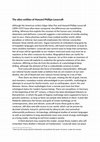Drafts by Marcel Poorthuis

(1890-1937) have often been compared, the differences are nonetheless striking. Whereas Poe explo... more (1890-1937) have often been compared, the differences are nonetheless striking. Whereas Poe exploits the recesses of the human soul, including obsessions and deliriums, Lovecraft suggests a real existence of worlds existing next to ours. Many phantasy authors have evoked another world, either paradisiac or infernal, but Lovecraft emphasizes the intrinsic connection between those worlds and ours. Vague memories of civilizations long gone by, of forgotten languages and horrid life forms, still haunt humankind, at least its more sensitive members. Lovecraft uses several ways to forge that connection. Not all ways will be agreeable to our modern mind and some may even be as repulsive as the alien creatures he evokes. Biographical data can clarify his tendency to resort to racial theories. However, let us first make an inventory of the devices Lovecraft exploits to underline the genuine existence of his alien creatures, differing as they do from the products of a psychological deep drilling, although the element of fear is undoubtedly common to both. First Lovecraft stresses the force of hereditary characteristics. Although our rational faculty would make us believe that we are masters of our own destiny, the call of blood and race reduces human beings to a toy of fate. Then there are these stories of the past, relating the life of gods, heroes and monsters, nowadays mainly acknowledged as pre-scientific, mythological attempts to account for fearful events, such as earthquakes, storm, fire and diseases. Hence, these mythologies from a remote past have lost their ontological status for modern human beings. There are exceptions: in Germany of the beginning of the 20 th century, a theory has been developed tributary to Romanticism, in which the gods of bygone mythology were supposed to have a genuine existence, as long as there are people who believe in them. A poet like Hölderlin addresses the heroes and gods of Greek mythology as his contemporaries, alive and vibrant. Lovecraft traces these gods to alien creatures, still alive and with access to our world, which can be proven by devoted scholarly research, performed by idiosyncratic and somewhat otherworldly professors. Archaeology, philological studies of ancient languages as well as inscriptions in long abandoned caves may reveal strange mythologies as a living reality, claiming its toll from modern society. A third element may surprise the reader, except those readers who will remember Mary Shelley's Monster of Frankenstein.1 Lovecraft does not place modern science and the forgotten world of alien creatures squarely opposite each other, but claims that modern science itself may reveal that other world. Scientists who have not yet discovered that faculty are so to say somewhat superficial and prejudiced by unproven dogmas, whereas the sensitive scientist will discover those horrid worlds by exploiting his theories to the full. 1 Note how the young scientist Frankenstein, persuaded by the power of science, creates his monster. 8 Lovecraft was well aware of the dozens Gothic and horror novels preceding him in Britain. He wrote a solid overview of this literature: Supernatural horror in literature.
Uploads
Drafts by Marcel Poorthuis